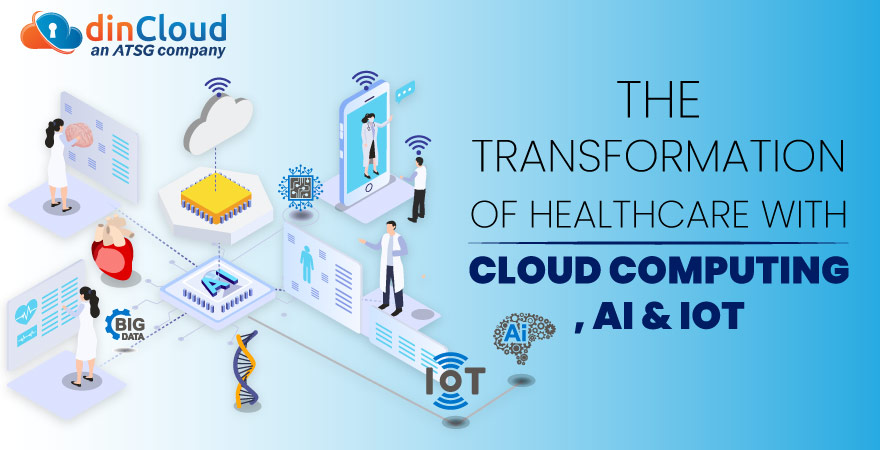When the Covid-19 pandemic shook the world like never before, the healthcare sector played a leading role in fighting back. The good part of it all is that transformation worth decades in healthcare has happened in a matter of just couple years.
The healthcare sector, traditionally known for its closed and well guarded boundaries, is opening up like never before. In this post, we will discuss how digital technologies like Cloud Computing, AI and IoT are transforming the healthcare sector.

Related: Hybrid Work Will Drive the Demand for DaaS and VDI
Cloud Computing – The Foundation of Digitalized Healthcare
The healthcare sector is literally vast on many counts. You not only have millions of patients in need of care right now, but this sector also has to cater to the emerging healthcare needs of the population as a whole.
Then, there is also the added element of limitless patient records and past histories. This valuable data is not only helpful in treating current patients, but also provides useful insights to perform research in the area of disease prevention.
Related: Healthcare to Remain a Prime Target for Ransomware in 2022
In all this scenario, the vast Cloud Computing ecosystem has the potential to function as the strong foundation upon which this whole digitalized healthcare mechanism will thrive. Over the Cloud, you have nearly limitless storage, compute and processing power.
Artificial Intelligence (AI) – One Step Closer to Personalized Care
Digital technologies like Artificial Intelligence (AI) are maturing at a mind boggling pace. The raw material or “food” for technologies like AI is vast amounts of data. The larger and more diverse a data set, the more useful and broad spectrum insights will be available.
This is an absolute necessity for the healthcare sector, as precious human lives are involved. Any glaring disparity in the data or findings thereof, may cause irreparable harm to a person’s health, thus defeating the whole purpose for such technologies.
By leveraging the vast amounts of data, AI can give useful and actionable insights into patients with chronic illnesses or in need of intensive care. AI based tools can make patient care proactive, instead of reactive.
Related: Top Reasons Enterprises Will Continue to Adopt Cloud Desktops in 2022?
This approach will not only improve patient care to a great extent, but also reduce the burden of already stretched out healthcare providers. Using AI, patient histories can be analyzed and correlated with other patients with similar symptoms.
This can give valuable insights to both healthcare providers and pharmaceutical companies about certain widespread diseases among the masses. By adopting a preventive approach, healthcare systems can avert expenses worth millions of dollars on such patients.
Related: The Year 2022 Could Mark the Beginning of Industry Clouds
The Internet of Things (IoT) – Transforming Personalized Healthcare
Like many other digital technologies, the IoT revolution is just upon us. The IoT landscape is rapidly evolving, and we are talking of billions of highly interconnected devices. IoT has a very instrumental role to play in the realm of healthcare.
Now, patients with medical conditions that need constant and close monitoring can be provided these smart IoT devices. These devices, due to their nimble size, will not impact the day to day lives of patients to a large extent.
Still, these IoT devices will constantly be generating real-time data about the key metrics of patients. This data will constantly be fed to the healthcare providers, remotely, in a seamless manner. As soon as any metric is outside the normal range, alarm can be raised.
That way, a patient can be provided instant and preventive medical aid, even before some medical harmful effect, such as a stroke, can actually set in. The patients will also feel much more relaxed and relieved, knowing their data is being monitored by smart, AI devices.
These smart IoT devices, lets say pacemakers, can also be fed with inputs that can adjust the response of medical devices remotely, thus eliminating the need for a healthcare professional personally visiting a patient and doing the same.
Related: How to Leverage Virtual Workspaces to the Max?
Conclusion
With the help of digital technologies like Cloud Computing, Artificial Intelligence (AI) and Internet of Things (IoT), the healthcare sector is at the verge of a revolution. This transformation of healthcare will positively impact both patients and health professionals.
Governments, healthcare providers and patients need to work closely, in an environment of trust to make this revolution as seamless and effective as possible. With active participation of all these stakeholders, we can cover a lot of ground within no time.
Contact dinCloud, an ATSG company, for Cloud Computing solutions that comply with some of the best international standards for security and privacy of sensitive data such as patient health records etc.


